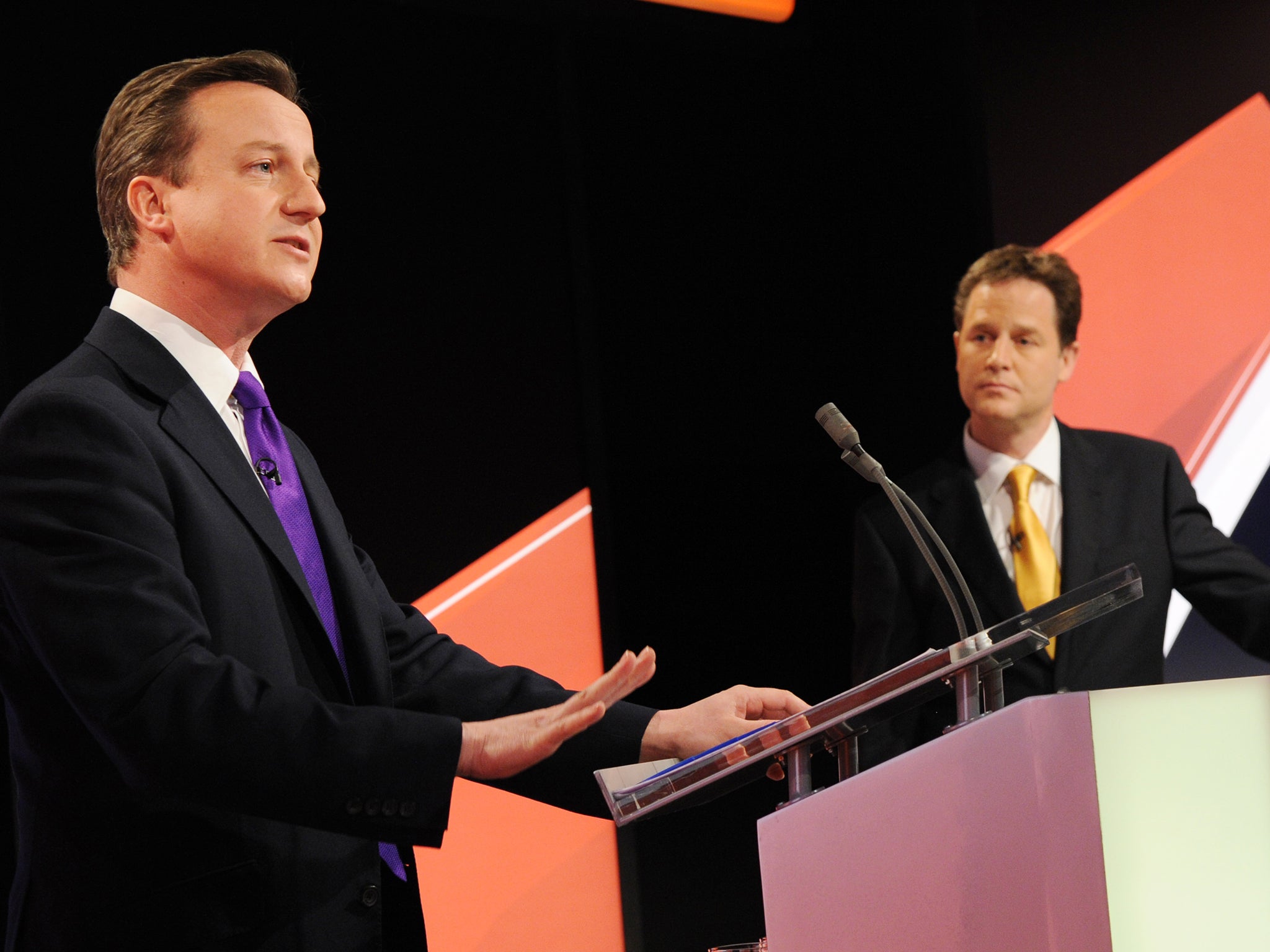In a media age, the public will judge Cameron as ‘frit’ if he doesn’t debate
Voters deserve to see each political contender have their claims tested


After an absence of more than 30 years, the word “frit” has come storming back into political vocabulary. And this localism, which Margaret Thatcher used to best Denis Healey in the Commons, when she challenged him with being “afraid? frightened? frit?” at the prospect of a general election, is every bit as potent as it was before.
In just the past week or so, we have heard it from the lips of politicians as ideologically remote from each other as the veteran Tory warrior Lord Tebbit and the Labour leader, Ed Miliband. They have revived it in one and the same context: David Cameron’s apparent reluctance to take part in televised election debates.
Their motives were quite different. Tebbit wanted to warn Cameron of how his apparent hesitation might be seen by the voting public, while Miliband had sensed a point of weakness and homed in on it during Prime Minister’s Questions. But they were both right in their judgement.
Refusing to debate could be fatal to David Cameron and his party on 7 May. In a close election, even the perception that he is being dragged unwillingly in front of the cameras would tell against him. “Frit” sums up everything that a political leader should not be – not just cowardly, but lacking the courage of his convictions.
It is hard to understand how this notably relaxed prime minister has got himself into this position. After all, public speaking and presentation have been integral to his success. His great advantage, even before he entered No 10, was that he always looked and sounded the part. His early years in public relations were not wasted.
So why is such a generally competent public performer skulking around, making excuses in the hope – so it seems – that the whole tedious thing will go away? More than a year ago, Downing Street seemed to be casting doubt on whether the 2010 experiment in televised debates would be repeated. Now we have the suggestion – threat even – that Cameron will not take part either at all or unless the Green Party is invited. This is a political misjudgement of the first order and traps him in the worst of almost every possible world.
Cameron’s sudden enthusiasm for the Green Party looks like a manoeuvre, even if it is not. You can make a perfectly good case that the leaders of all parties with MPs in the House of Commons should take part in televised pre-election hustings. But what you then have is something akin to a protracted BBC Question Time. You do not have a debate. The broadcasting watchdog, Ofcom, in rejecting Cameron’s request, seems to agree.
What the public rightly expects – even at what we keep being told is a time when the two-party system is breaking down – is a duel. As we saw five years ago, three is just about manageable, though the arguments become less clear-cut. More than that, though, and you might as well abandon the whole concept.
In one way, it is surprising how late the UK came to televised election debates. Given the adversarial nature of British politics generally, and the fact that the Prime Minister and the Leader of the Opposition face each other pretty much every week across the dispatch box at Prime Minister’s Questions, television debates would seem a logical extension. Against this, opponents of election debates might say that this weekly duel renders special election encounters superfluous. Others detest debates as circuses that, in their view, debase politics or, at the constitutional level, as a presidential-style deformation of our parliamentary system.
Such arguments are specious. The voters deserve to see the most likely contenders for prime minister test their claims against one another directly, and in a disciplined contest with fair rules. Whether Cameron likes it or not, presenting a case to the widest possible public is an essential part of politics in the media age.
Why might Cameron be less keen on debating than he once was? He was clearly unhappy about losing the first debate last time around to Nick Clegg. Ukip’s arguments are, superficially at least, harder for the Conservatives to parry than for Labour. And Ed Miliband, as the Tory grandee Lord Patten warned recently, could turn out to be a strong debater. It would reflect poorly on Cameron if he were avoiding a debate for any of these reasons.
His difficulty is, however, that, even if his motives are altogether more principled, this is not how his reluctance will be understood. From deep inside an election campaign, television debates might look like a dispensable luxury. That is not how they look to the voting public. “Frit”, as Margaret Thatcher understood, is a devastatingly effective word.
Join our commenting forum
Join thought-provoking conversations, follow other Independent readers and see their replies
Comments